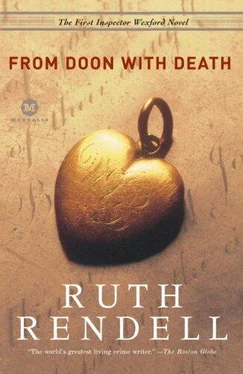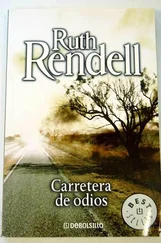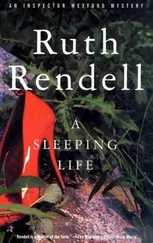‘Did you see Douglas?’ Her tone was wistful but she had cheered up since he had last seen her. The bikini had been changed for a printed silk dress, high-heeled shoes and a big hat.
The question was beneath Wexford’s dignity.
‘Mrs Quadrant was able to fill in a few gaps,’ he said.
‘Fabia was? You amaze me. She’s very discreet. Just as well, Douglas being what he is.’ For a moment her pretty face was swollen with sensuality.
‘He’s magnificent, isn’t he? He’s splendid.’ Shaking herself, she drew her hand across the face and when she withdrew it Wexford saw that the lust had been wiped away. ‘My Christ,’ she said, once more cheerful and outrageous, ‘some people don’t know when they’re well off!’ She unlocked the garage doors, opened the boot of the red Dauphine and took out a pair of flatter shoes.
‘I had the impression,’ Wexford said, ‘that there was something else you wanted to tell me.’ He paused. ‘When your husband interrupted us.’
‘Perhaps there was and perhaps mere wasn’t. I don’t think I will now.’ The shoes changed, she danced up to the car and swung the door open.
‘Off to the cinema?’ Wexford asked.
She banged the door and switched on the ignition.
‘Damn you!’ Wexford heard her shout above the roar of the engine.
We were young, we were merry, we were very very wise. And the door stood open at our feast…
Mary Coleridge, Unwelcome
Nectarine Cottage lay in a damp hollow, a bramble-filled basin behind the Stowerton Road. The approach down a winding path was hazardous and Miss Clarke was taking no chances. Notices pencilled on lined paper greeted Burden.at intervals as he descended. The first on the gate had commanded Lift and push hard; the second, some ten feet down the path. Mind barbed wire. Presently the brambles gave place to faint traces of cultivation. This was of a strictly utilitarian kind, rows of sad cabbages among the weeds, a splendid marrow plant protected from the thistles by a home-made cloche. Someone had pinned a sheet of paper to its roof. Do not remove glass. Evidently Miss Clarke had clumsy friends or was the victim of trespassers. This Burden could understand, for there was nothing to indicate habitation but the vegetables and the notices, and the cottage only came into view when he was almost upon it at the end of the path.
The door stood wide open and from within came rich gurgling giggles. For a moment he thought that, although there were no other houses in the lane, he had come to the wrong place. He rapped on the door, the giggles rose to a gale and someone called out
‘Is that you, Dodo? We’d almost given you up.’ Dodo might be a man or a woman, probably a woman. Burden gave a very masculine cough. ‘Oh, gosh, it isn’t,’ said the voice. ‘I tell you what, Di. It must be old Fanny Fowler’s cop, a coughing cop.’
Burden felt uncommonly foolish. The voice seemed to come from behind a closed door at the end of the passage.
He called loudly, ‘Inspector Burden, madam!’
The door was immediately flung open and a woman came out dressed like a Tyrolean peasant. Her fair hair was drawn tightly back and twisted round her head in plaits.
‘Oh, gosh,’ she said again. ‘I didn’t realize the front door was still open. I was only kidding about you being Miss Fowler’s cop. She rang up and said you might come.’
‘Miss Clarke?’
‘Who else?’ Burden thought she looked very odd, a grown woman dressed up as Humperdinck’s Gretel. ‘Come and pig it along with Di and me in the dungeon,’ she said.
Burden followed her into the kitchen. Mind the steps, said another notice pinned to the door and he saw it just in time to stop himself crashing down the three steep steps to the slate-flagged floor. The kitchen was even nastier than Mrs Parsons’ and much less clean. But outside the window the sun was shining and a red rose pressed against the diamond panes.
There was nothing odd about the woman Miss Clarke had called Di. It might have been Mrs Parsons’ double sitting at the table eating toast, only this woman’s hair was black and she wore glasses.
‘Di Plunkett, Inspector Burden’ Clare Clarke said. ‘Sit down, Inspector - not that stool. It’s got fat on it -and have a cup of tea.’
Burden refused the tea and sat on a wooden chair that looked fairly clean.
‘I’ve no objection if you talk while I eat,’ said Miss Clarke, bursting once more into giggles. She peered at a tin of jam and said crossly to her companion: ‘Confound it! South African. I know I shan’t fancy it now.’ She pouted and said dramatically, ‘Ashes on my tongue!’ But Burden noticed that she helped herself generously and spread the jam on to a doorstep of bread. With her mouth full she said to him: ‘Fire away. I’m all ears.’
‘All I really want to know is if you can tell me the names of any of Mrs Parsons’ boy friends when she was Margaret Godfrey, when you knew her.’
Miss Clarke smacked her lips.
‘You’ve come to the right shop,’ she said. I’ve got a memory like an elephant.’
‘You can say that again,’ said Di Plunkett, ‘and it's not only your memory.’ They both laughed, Miss Clarke with great good humour.
‘I remember Margaret Godfrey perfectly,’ she said. ‘Second-class brain, anaemic looks, personality both prim and dim. Still, de mortuis and all that jazz, you know. (Prang that fly, Di. There’s a squeegy-weegy sprayer thing on the shelf behind your great bonce.) Not a very social type, Margaret, no community spirit. Went around with a female called Bertram, vanished now into the mists of obscurity. (Got him, Di!) Chummed up with one Fabia Rogers for a while - Fabia, forsooth! not to mention Diana Stevens of sinister memory -‘
Miss or Mrs Plunkett broke in with a scream of laughter and waving the fly-killer made as if to fire a stream of liquid at Miss Clarke’s head. Burden shifted his chair out of range.
Ducking and giggling, Clare Clarke went on: ‘… Now notorious in the Stowerton rural district as Mrs William Plunkett, one of this one-eyed burg’s most illustrious sons!’
‘You are a scream, Clare,’ Mrs Plunkett gasped. ‘Really, I envy those lucky members of the upper fourth. When I think of what we had to put up with-’
‘What about boy friends. Miss Clarke?’
‘Cherchez l‘homme, eh? I said you’d come to the right shop. D’you remember, Di, when she went out with him the first time and we sat behind them in the pictures? Oh, gosh, I’ll never forget that to my dying day.’
‘Talk about sloppy,’ said Mis Plunkett ‘“Do you mind if I hold your hand, Margaret?” I thought you were going to burst a blood-vessel, Clare.’
‘What was his name?’ Burden was bored and at the same time angry. He thought the years had toughened him, but now the picture of the green and white bundle in the wood swam before his eyes; that and Parsons’ face. He realized that of all the people they had interviewed he hadn’t liked a single one. Was there no pity in any of them, no common mercy?
‘What was his name?’ he said again wearily. ‘Dudley Drury. On my sacred oath, Dudley Drury.’
‘What a name to go to bed with,’ Mrs Plunkett said.
Clare Clarke whispered in her ear, but loud enough for Burden to hear: ‘She never did! Not on your sweet life’
Mrs Plunkett saw his face and looked a little ashamed. She said defensively in a belated effort to help:
‘He’s still around if you want to trace him. He lives down by Stowerton Station. Surely you don’t think he killed Meg Godfrey?’
Clare Clarke said suddenly: ‘She was quite pretty. He was very keen on her. She didn’t look like that then, you know, not like that ghastly mockery in the paper. I think I’ve got a snap somewhere. All girls together.’
Читать дальше











